#Editions Fleuve
Text
Prendre la vie comme elle vient de Carène PONTE - Mon premier roman de l'auteure
Le résumé des éditions FLEUVE – 06 avril 2023 : La vie d’Alice vient de s’écrouler… Ou peut-être commence-t-elle ?” Qu’est-ce que je faisais exactement à cet instant-là ? J’aurai beau me concentrer de toutes mes forces, fermer les yeux pour mieux visualiser, jamais je ne parviendrai à me souvenir. Est-ce que j’avais un livre dans la main ? Étais-je en train de sourire en pensant à la Toscane ?On…

View On WordPress
0 notes
Text
Lecture: La collectionneuse de mots oubliés, de Pip Williams
La collectionneuse de mots oubliés est un roman qui se déroule à la fin du 19ème et au début du 20ème siècle. On y découvre l’histoire d’Esme, une jeune fille qui grandit au sein de l’équipe éditoriale de l’Oxford English Dictionary. Son père y travaille comme lexicographe, et Esme développe rapidement une fascination pour les mots et leur pouvoir.
Continue reading Untitled
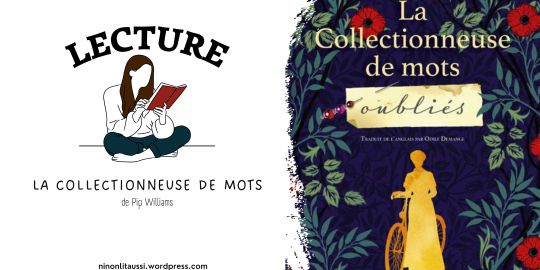
View On WordPress
0 notes
Text
Et que quelqu'un vous tente la main de Carène Ponte
Et que quelqu’un vous tente la main de Carène Ponte
Editeur : Fleuve Editions
Résumé :
Le Jardin des Cybèles est une maison de repos qui accueille des personnes abîmées par la vie. Cet été, elle ouvre ses portes à deux nouvelles pensionnaires : Valérie et Anna.
Quelques jours après leur arrivée, elles font la connaissance de Charline, la propriétaire d’une pâtisserie voisine. Ce lieu chaleureux devient un véritable refuge pour les deux femmes,…

View On WordPress
0 notes
Text
Btw Natsu didn’t “snap” last chapter. He called out to Lucy, it’s different. Snapping implies that he was mad or upset over Lucy’s actions, but I truly don’t think he was: he just noticed that she wasn’t fighting, and he knew she was needed in this fight, so he cried out for her.
I’m upset over people calling him angry, that he snapped and got mad and yelled at her. That’s literally not what happened: Natsu saying “Just shut your mouth for once!” With a dark, clearly very angry face, when she unknowingly talked about Lisanna before she returned from Edolas - that is him snapping.

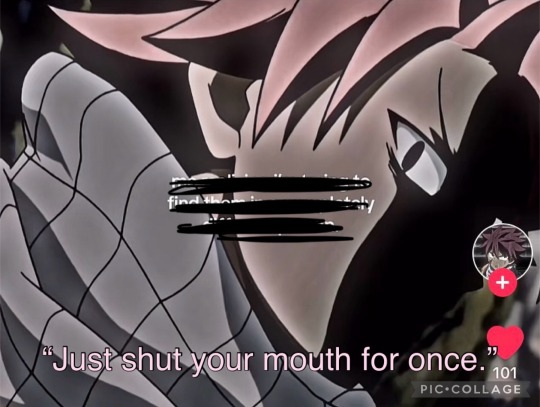
(I could only find the scene on TikTok lol, credits go to @dailydragneel even if I edited it a bit)
Maybe it’s not that deep, but I feel like the nuances matter. There was nothing that indicated that Natsu was angry with Lucy, the “Lucy, please…” panel showed more that he felt helpless, knowing that their efforts didn’t seem to make a difference in the fight. So he called out for Lucy. (Here’s the panels so you can compare with the actual angry Natsu)

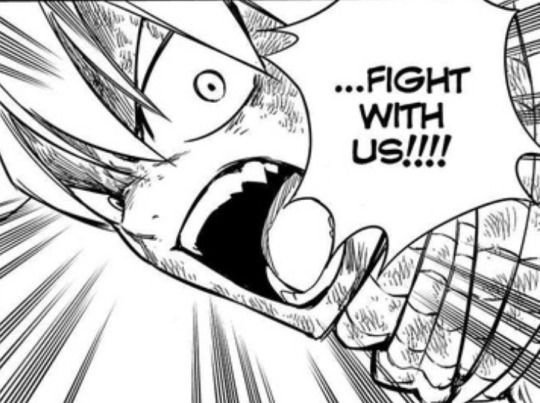
In the hyq he looks upset and stressed, but I don’t think those emotions were aimed at her. Maybe I’m choosing to see it differently, but I think he’s upset and desperate in the situation, and that he’s raising his voice and straining himself because he’s in the middle of a fight.
Anyways that’s my two cents.
(Nice addition in the tags by @fleuve-des-etoiles )

#fairy tail#lucy heartfilia#natsu dragneel#fairy tail 100 years quest#hiro mashima#ft 100yq#atsuo ueda#can i call this a meta?#mild nalu#it’s understood#nalu
92 notes
·
View notes
Text
from wangshu inn to the fleuve cendre
xiao/aether | rating: G | 1.6k words
Xiao reads of Aether's journey in Fontaine in The Steambird. He realizes that in Aether's absence, he's picked up the habit of collecting little pieces of him everywhere he goes.
Adeptus Xiao never used to keep track of the days of the week, but now he knows that it is a Sunday.
And it is precisely because it’s a Sunday that he now stands before Verr Goldet’s desk, arms crossed and waiting at the earliest sliver of dawn.
“Morning, Adeptus Xiao,” Xiao can’t understand the hidden meaning in Verr’s smile, but lately he’s been wondering if she’s teasing him. “The courier came early today.”
Xiao knows. He had heard him arrive just ten minutes ago to deliver the mail at the foot of the Inn.
“Paper?” Xiao tries not to look too impatient. Wei meows and nudges her head along Xiao’s wrist and this time, he doesn’t flinch.
Verr flashes him that unknowable smile again. She slides the freshly pressed newspaper across the counter before hiding a yawn with her palm.
“Looks like he’s solved some cold case this time after getting roped into standing trial for that Fatui member,” Verr mumbles. “But well… that’s Aether for you.”
Xiao snatches the latest edition of The Steambird from the counter, the paper crinkling in his hands.
Washed Up Mysteries Brought to Light: Spina di Rosula Brings the Longstanding Serial Disappearances Case to a Close
Golden Haired Traveler Unearths Key Evidence Amidst Trial
Xiao quickly skims the front page and that ever present anxiety in his chest loosens just a fraction. He releases his grip on the paper.
He’s alright.
When Xiao turns the page, his eyes widen. The Steambird always included photos in their features, but every so often, when Aether did something big enough to make the headlines, they would sometimes include a photo of him.
And this one did.
It was a clandestine, but striking picture of him standing inside a large courthouse, speaking to a man sitting upon a high dais. Aether appears to be in the middle of a speech, his arm raised upright as he holds some kind of book in his left hand. His face looks uncharacteristically grave.
Even through the photo, Xiao catches the tired line of his body, the hard set of his brow. The adeptus’ heart aches with a restless worry.
He stares at the photo long enough to bore holes in the paper. Verr clears her throat.
“Was he injured?” Xiao asks bluntly because he can’t be bothered to slowly read through the flowery, sensationalist paragraphs right now. He would, later. He would read them over and over again until he’s committed the series of events to memory. But at present, Aether’s safety is his most immediate, pressing concern.
“I don’t believe so,” Verr blinks at him slowly. “All they said was that he rushed into the Opera House to deliver the key piece of evidence against the criminal behind this case. It was… really harrowing stuff.”
Xiao frowns slightly at the ambiguous answer. He knows by now that the papers only cover the most noteworthy and relevant details to the story. But any number of unknown and unseen dangers could have happened behind the scenes.
Xiao exhales through his nose. There is so much he may never know about Aether and his own lack of knowledge frustrates him.
“What is Spina di… Rosula?” Xiao points to the words. Verr peers over the counter.
“Hmm, like an organization of private investigators. They were the ones that Aether was working with on this case.”
“He is safe with them?” Xiao’s brows furrow. Verr’s expression softens into something unreadable as she gives a gentle sigh.
He knows exactly what Verr is going to say but he wants to hear it again anyway.
“Aether is a very capable traveler, Xiao,” Verr says, as if she hasn’t told him this ever since he started reading the paper. “You don’t need to worry about him.”
“… Right,” Xiao folds the paper neatly under his arm and nods to Verr.
“Thank you, Verr,'' he turns to leave, but this time, Verr calls out to him before he can disappear.
Her voice is hesitant, “You could write to him, you know.”
Xiao pauses, turning slowly. “Write?”
Ver nods. “A letter. In the mail. I know he’d appreciate it.”
The adeptus actually considers it, for the briefest of moments, before he gives a small scoff. How would you send a letter to someone without a home? And what could Xiao possibly tell Aether that would be of value to him in his journeys in distant, foreign lands?
Writing a letter would be useless. Xiao would hate to distract him from his duties.
“No need.”
***
Xiao is aware that he never used to be like this.
He never read newspapers. He couldn’t have cared less about current affairs or the latest fashion trends in other nations. Up until a week ago, he didn’t even know the meaning of things like “pressing charges” or “court cases.”
But now as he unfurls the latest Steambird in his chambers alongside his copy of the Updated Teyvat Idioms Dictionary, he wonders if his behavior is perhaps more than a mere idle fixation on Aether’s whereabouts and safety.
In his chambers sits a stack of various newspaper cut-outs forming a timeline of Aether’s journey across Teyvat from the time that he first stepped foot off Liyue. Everything from the grandiose to the mundane― the traveler seemed to make headlines wherever he went, not that Xiao was particularly surprised.
“... evidence dismantled the defendant's prior defense…” Xiao mumbles to himself.
Once he’s finished thoroughly reading the article, he reads it again, then crosses his arms deep in thought. A sharp pang of admiration and pride warms his chest, alongside an uncomfortable, aching kind of pain.
He picks up the page with Aether’s photo on it.
It’s been two seasons since Xiao’s last seen him in person at the last Lantern Rite.
Before the traveler, Xiao never thought about things like seasons and dates and couriers and newspapers.
But he has never felt the pull of time and distance so strongly as when Aether leaves him. He finds his mind drifting in between his duties, conjuring up images of him meeting new people, seeing new sights.
What is he doing right now? Xiao would wonder in the morning. Has he rested well?
Is anything troubling him? At noon. Has he eaten? Is he safe? In the uneasy quiet of the night.
Xiao would sometimes even find himself staring at the sunset and imagining Aether is watching the very same one, in some city far out of his reach. It seems that every waking hour, Aether finds his way into Xiao’s thoughts but all that he’s left with are scattered newspaper cutouts and stolen, eavesdropped conversations from passersby.
Verr voice echoes in his head. You could write to him.
If he wishes to hear from me, he’d call, a small part of Xiao thinks firmly.
But Aether rarely calls Xiao’s name.
“I don’t want to use you in that way… You are more to me than just a weapon, Xiao,” Aether had said.
Xiao hadn’t understood it at the time, but now he’s deduced that Aether merely doesn’t want to trouble him―although that doesn’t make his absence feel any less total.
All he can do is wait. And perhaps it is this waiting, though unbearably heavy at times, that has also colored Xiao’s world with meaning. Each day is now filled with the possibility of him everywhere and Xiao finds himself watching for a speck of gold in the distance.
He only wishes he were able to make sense of the strong tug inside his chest that threatens to steal his breath every time he sees Aether’s photo. Or the steady ache he feels when he sifts through his memories of Aether one by one like precious stones.
It wasn’t pain, but the ghost of it. He sets the photo of Aether aside and turns away, feeling the feeling right now, in every pulse of his heart.
Perhaps he should write a letter. Perhaps he shouldn’t.
Regardless, until he sees him again, Xiao would wait. Someone like him had nothing but time, after all.
***
The next morning, Verr Goldet spots a sheet of paper on her desk, the page filled top to bottom with loose handwriting. A letter, she realizes. For the Traveler.
Of course Adeptus Xiao would have no concept of secrecy and had simply left the open letter on her desk with the trust that she would send it to the right place. Verr smiles a little to herself, scanning briefly over the letter. She wonders how many tries it had taken the adeptus to write it properly before settling on the one before her now.
It reads as follows:
Aether,
I read of your deeds in Fontaine.
Once, you referred to myself and my fellow Yaksha as “heroes” but to me, there seems no one else more fitting for such a title than you. You are admirable, honorable, and above all, kind.
Lately I have taken to reading “The Steambird.” This is how I have come to know about your actions in other nations. I hope you do not mind. As you know, engaging in mortal pastimes is new to me, but I have found the activity to be rewarding if only because it has made me feel a little closer to you.
Although, I think that… I would much prefer hearing these stories from your own lips, in your own voice.
I know well that you are adept and capable of fending for yourself but I still worry about the dangers you face. You have a habit of intentionally putting yourself in harm’s way. The stories in the paper can only tell me so much. Tell me that you are alright.
And… if you have the time, I would love enjoy your company. Come and tell me about your time in Fontaine, I will listen.
If you don’t have the time… I will wait.
Xiao
#ficlets#genshin ficlet#xiaoaether#aexiao#xiaother#genshin impact#fontaine#minific#might post to ao3 later cause this ended up longer than a drabble but idk
85 notes
·
View notes
Text
French fantasy review: Les flammes de la nuit
I do wonder why I make these posts – about French novels that I do not think were translated in English, reviewing them in English on an English-speaking website… I do know that some French people are lurking around under a mask of Englishness, but still, most people here are those that I guess will never have access to the novels I review… But oh well, I’ll do what I’ll do, as bizarre as it may sound: and what I’ll do is talk about the French fantasy.
I already translated a long time ago some articles written about the French fantasy literature, but here I will share my personal thoughts and favorites when it comes to this genre of fantasy that is considered “foreign” and “exotic” by the simple virtue of… not being written in English. France is the land of literature, and has already bred, nursed and thoroughly exploited and theorized the two genres that gave birth to the fantasy and yet are so hard to translate in English: the merveilleux of fables and epics, the fantastique of 19th century supernatural tales… Why wouldn’t France have fantasy too? The name of the genre stays English, unfortunately, but it has enough echoes and roots within our own féeries and surnaturel to find a place prepared for it since centuries…
Anyway, enough lyrical: let’s get into the meat of the subject, let’s dig to the bone, and I want to begin with “Les flammes de la nuit” (The flames of the night) by Michel Pagel.
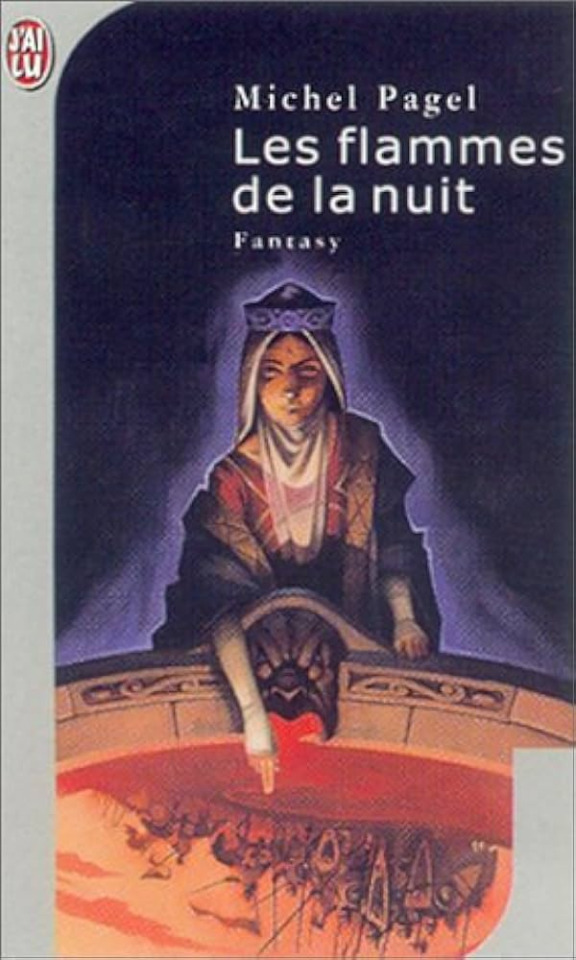
When I picked up this book I was not expecting anything precisely from it, I was just curious. I had only ever heard of Michel Pagel through a huge and dark series of his called “La Comédie Inhumaine” that everybody loved and that was renowned as a dark and violent fantastique, but I never read it. The reason I picked up this book was due to its relationship with fairytales. If you do not know I am REALLY into fairytale stuff, I even have an entire sideblog just to talk about fairytales ( @adarkrainbow ). And this novel was advertised as being a fairytale subversion, so I thought, let’s get into it! [EDIT: I actually also had heard of Michel Pagel through another work of his that now I will definitively read, Le Roi d’Août, a supernatural historical novel that faithfully retells the biography of the king Philippe Auguste… While filling some historical blanks in his life by the intervention and encounter of the supernatural folks hiding within the French landscape.]
Most notably, when I checked briefly online reviews to see if I should get the book, all agreed on a same thing: all said that the book was absolutely great, with wonderful ideas and powerful characters… until the very end which had disappointed everybody (at least at the time the reviews were made, so by the 2000s/early 2010s). As a result I went into this novel saying to myself “Okay, the beginning and middle will be great, the end will be bad, get ready”. And… what a surprise! The ending was not bad at all. A bit confused and rushed but… it was a good ending. Or rather a fitting ending (because it is not a happy or positive one, nor is it a negative one – it is a grandiose, tragic, bittersweet but hopeful ending perfect for the tone of the novel and the project the author set upon himself). If you ask me, all the reviews were wrong – and I had been deceived for the best, since the novel surpassed what I was expecting. Now, I won’t throw the stone, I actually understand why these readers were disappointed with the ending and I’ll explain why (spoiler: it is a question of context and point of view). For now, I’ll simply say that I greatly love this novel which definitively goes into my top French fantasy novels.
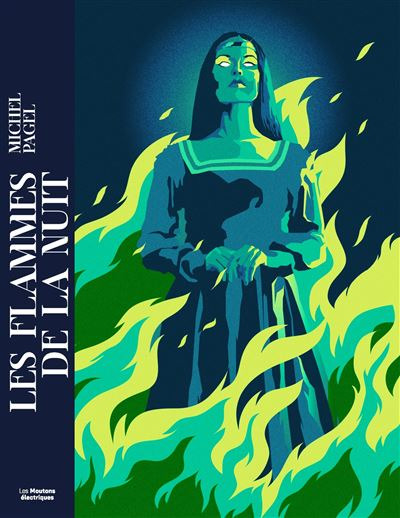
In terms of editions and publications, a few indications… This is one of those typical edition thingies that are so peculiar to France. The novel was originally published as a series of novellas. Four in total, between 1985 and 1987, in the “Anticipations” collection of the Fleuve Noir publishing house (it was still in this era where in France fantasy and sci-fi were sold together as one and the same). Later, the four novellas were collected into one full volume, one novel divided into four parts. This complete volume was published in 2000 (in a small format by the J’ai Lu Poche Fantasy, in a large format by Denoël collection Lunes d'encre), and it is both the version I read and the one most people refer to when talking about “Les flammes de la nuit”. I do not know if the text was edited or slightly rewritten for this new format – I don’t think so, but I have to admit the text felt so much like an early 2000s story I was quite surprised it came from the mid-80s… There’s quite notably the fact the main character is openly bisexual, but hey, the 80s in France were quite a time too… More recently in 2014 Les Moutons Electrique republished the integral in a large format, and then in 2022 in a middle format, proving this novel’s great and enduring success.
[Note: As I am writing this post I made a quick checklist and I just discovered that Michel Pagel actually was the French translator of Neil Gaiman’s Anansi Boys and American Gods, as well as of Gary Gygax’s Monster Manual for D&D… Wow, that was a total surprise – and it does explain some things, I notably see how Neil Gaiman’s writing could have had an influence over this novel…]
Let me briefly set you in the mood the very first pages plunge the reader into… We follow an old man who is travelling on a pilgrimage to a great lake at the center of a medieval kingdom name Fuinör. He isn’t just any old man: it is but one of his masks. He is the Enchanter, a great and powerful wizard as old as the universe itself, a supernatural being known to take many forms, and who can be as much a wild animal of omens as a seducing woman luring knights to an uncertain doom… Once he reaches the great lake, called the Mirror for its still waters form the perfect reflection of the sky and the sun above it, in a great burst of light, the sun disappears… and reappears. But the sun is not golden anymore: it is green. And with the sun everything changed color within Fuinör: the sky is not blue but indigo, the sea is the color of emerald, the trees have blue leaves, human skin is orange… And this is perfectly normal, for in the world of Fuinör, every seven years the sun is reborn above the lake, turning into a different color, and with it everything in the world also changes its hue. And as such, seven year by seven year, the light goes through all the seven colors of the rainbow…
This sets the stage for what “Les flammes de la nuit” is. And it is many, many things, a story which likes the sun of Fuinör undergoes different stages and tones (the serial publication helps this feeling of slow transition and evolution throughout the novel).
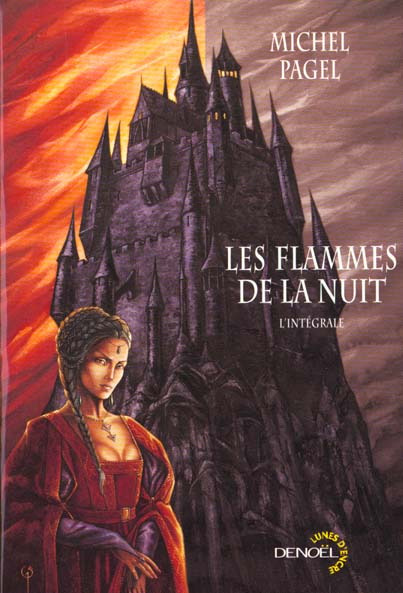
The story opens as an open, cynical and dark parody of fairytales – for the world of Fuinör is a world of stock fairytales. It is a world in which, when the king has a daughter, seven fairies, each for each color of the rainbow, arrive to bless her with all the usual gifts – beauty, grace, singing – while carefully avoiding anything like strength or intelligence, for these are male gifts for those destined to rule. It is a world in which, when the queen gives an heir to her king (and there is always only one king and one queen), she must die in labor – and if she happens to survive… then the royal doctor must prepare a certain powder to make sure the queen respects the tradition. It is a world where barons often declare themselves vile rebels and wicked usurpers and try to overthrow the high king… but they are always defeated because the law claims there can only be one rebellion at a time, and each baron must warn in advance the king and let him decide how, when and where he wants to do the battle. It is a world where there is a land for each thing – quite literally. Fuinör is divided into different “countries” each dedicated to a specific area: there is a land of Hunting, where the hunts take place, and any hunting elsewhere is outlawed. There is a land for War, and nobody would ever think of waging war elsewhere than there. There is a land for Love, and all love and romance and sex can only take place within its boundaries. Such as the laws, and the customs, and the traditions, and they have always been since the beginning of time…
Fuinör is a mix of all the classical fairytales and the traditional medieval romance and Arthurian tales – but all taken to an extreme. Fuinör is a world stuck in an endless cycle of loops, where the events all repeat themselves in the same way with predictable end, where everyone is given a specific role and fate since birth, where everything is stuck under an order that has been decided by ominous gods a long time ago, and where no surprise and no disorder can ever happen. The brave knights in shining armor always win the heart of princesses, the high king is always victorious of anyone that tries to take his throne – and if someone ever does, THEY are the rightful high king and the other is the usurper – and the peasants… well who cares, they don’t count, they’re not even considered human, they are just here to work and be background props.
But things will change… Things will change thanks to the Enchanter, who decides that when the new princess of the kingdom is born, little Rowena, she shall receive a gift no other princess ever received… the gift of intelligence. An intelligence that will allow her to understand the absurd logic of her world, and use the sclerosis of archetypes and the rigidity of millennia-old customs to her advantage. An intelligence that will make her greater and more powerful than anyone – an intelligence that will threaten the very existence of Fuinör… Thus is the beginning of “Les Flammes de la Nuit”.
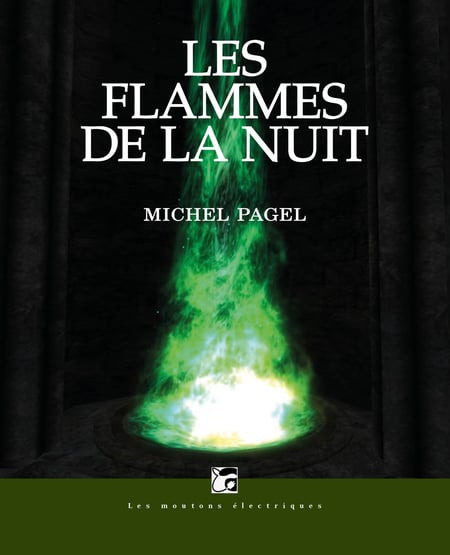
The beginning of the novel, Rowena’s own youth and story, is clearly designed to deconstruct all the archetypes, stereotypes and point out all the bad side of both the generic fairytale (especially Disney’s version of fairytales – the novel is filled with jabs at Disney and the “Americanized” fairytale, the seven fairies being basically Disney’s fairy godmothers mixed with Glinda from The Wizard of Oz MGM movie) and of the Arthurian romance as we know it today. It does not mean Michel Pagel hates those genres, quite the contrary! This book heavily pays homage to both domain, in which Pagel has clearly a great interest. In fact, this book is much more “medieval romance/Arthurian epic” than fairytale in tone, and while anybody who saw the Disney movies or read Perrault will get the fairytale references, I do believe someone with zero knowledge of the Arthuriana will miss a LOT of cultural jokes and clever references in this text. From the get go the Enchanter is clearly supposed to be inspired by Merlin from the Arthurian myth – but not the Disneyified, Americanized Merlin. The original Merlin, Myrddinn, the mythical, legendary, ambiguous and terrifying entity that exists beyond shapes and times and manipulates fate as he pleases… In a similar way, if you haven’t done any research on the evolution of the legend of Avalon you won’t get how twisted and cool the climax within the domain of the Fairies is… But I won’t reveal too much spoilers.
But loving doesn’t mean being uncritical, and this book is clearly the result of Michel Pagel thinking about what he adores, and highlighting in an entertaining way all that is wrong with those classical tales. The first part of the story is centered around Rowena, this intelligent and daring girl born within a world of the worst fairytale stereotypes and outdated medieval chivalry. And as she grows up she gets to explore what others were too afraid to explore, she understands what nobody understood, she gains power nobody had access to before… all the while suffering from what her world really is: unfair, classicist, sexist, misogynistic and abusive. And this begins already the bittersweet tone of the novel. At the same time we have a very funny parody that enjoys dark humor and plays all the code of the traditional “fractured fairytale”, and yet it alternates with very sad and dark moments where Rowena is confronted with the cruelties of such a universe and understands why being an intelligent girl in a world where women are to be submissive and stupid can be dangerous. But all is in fact set and prepared for her own fate, prepared by the Enchanter in person: for Rowena will become… the Witch.
And of course I love this, because who doesn’t get to love a dark retelling of fairytales, who doesn’t like a faithful retelling of medieval epics with an acute sense of modern values clashing with outdated morals, who doesn’t get to love the story of how a girl became a witch-queen? But… I think this is where the “fracture” with a certain part of the audience happened. I will return to the reviews I talked about above: many people thought the ending was worthless or were betrayed by it. Having read the novel I understand why they felt that: in their own words, they were sold and expected a feminist retelling of fairytales about breaking conventions and stereotypes. They were sold the story of a girl being a hero, and the old fairytale clichés being mercilessly mocked and denounced and beaten upon. And that was it for them. As such, yes, the ending probably disappointed them… Because it isn’t what the story is about.
It is made clear in the beginning of the story: being a Witch is not a pleasant thing. It is not a power fantasy. It might look like it, and Rowena uses it as such, but we are clearly warned that a Witch is still an unpleasant, dangerous and sometimes disgusting existence which will require suffering, both inflicted by the Witch and received by her. It is in such a path Rowena sets herself upon – and this is part of a greater scope of things. Rowena is the main character of the novel, but she is part of a wider plot by the Enchanter. The Enchanter wants to break the endless, frozen cycle of Fuinör. He wants to destroy those paralyzing traditions and this unnatural order. He wants to plunge back the world into chaos – a benevolent, needed, positive chaos, but a chaos still. And one of the very strong messages of this tale is: a need to go beyond Manicheism. To go beyond simplistic duality or archetypal characters. What Rowena, and the Enchanter, and others later, bring is complexity. The entire point of the novel is to go beyond the idea that there is all good and all bad, clear cut good and evil, black and white. As such, slowly as the cosmic battle wages on, as the Tradition and the Divine Law unravel, the characters grow into shades of gray as all their values, their positions and their allegiances are redefined, put to test or exposed, as the very machine of the universe starts to be pulled apart. Characters that start out as nice and lovable heroes turn into selfish villains. Characters that appear as flawed jerks and unsympathetic narrators learn from their mistake and grow heroic and wise. Courageous warriors grow into cowards, figures of sanity become mad, and this entire novel is the story of one huge revolution where everything changes: moralities, social hierarchies, laws of justice, and even genders! (The novel notably features an exploration of non-binary genders through one specific character – or three depending on how you count it – not including the various shapeshifting of the supernatural entities, which again helps make it resonate with a modern audience despite being around for quite a long time)
As such, no, this story is not a feminist power fantasy, and those that go in expecting this will be disappointed. It is a much, much larger and complex story about an entire world, about this fictional place born out of the classic fairytales and the medieval romances and the Arthuriana, and how this thing is confronted with its own choice of “evolve or die”. And this is still a very powerful and admirable story, which at the same plays subverts tropes, while also playing many clichés and stereotypes straight, but with a clear knowledge of this. Some people in the reviews said they were disappointed that ultimately, it seemed that Michel Pagel, in trying to break down and denounce clichés, ended up himself reasserting those same clichés. And I honestly do not think it is the case – as the novel is rather a strong defense of “We should get rid of all clichés and stereotypes, because they’re always going to trap us, no matter on which side they are”. But again, I can’t reveal too much without spoiling this long modern epic.

A good example of why for example this novel isn’t a pure “feminist fantasy” as many believed: Rowena is not the only main character. There’s another one, a “male counterpart” so to speak of the Witch-Queen in training. A character who doesn’t really have a name (well he has one but it is kind of a spoiler domain), and whose own backstory forms the second part of the novel (or the second novella of the series). A character who lives in a different part of Fuinör, and also should have been trapped in a cycle of millennia-old rituals and binding traditions and unfair customs, but whose fate changes completely due to the interventions of the Witch and the Enchanter… Except that, whereas with Rowena we had a bittersweet parody of Disney movies and traditional fairytales, with this second character we rather explore a deconstruction and attack of a different type of folktales. There is notably a brutal takedown of the whole “Journey of the Hero” system and the “Monomyth” idea. And I don’t say “brutal” lightly: this part of the novel is very, very brutal, physically speaking. Because this second main character is the helpful companion on the road in fairytales that helps the hero get the girl while himself having nothing. He is also the stock archetype of the Fool doomed to make mistakes and be ridiculed or punished. And he is the False Pretender, the False Hero of fairytales here to put in value the True Hero… Except we are told the story through his point of view. Except he is not evil, he is a guy who is trying his best but is put in an unfair position and only gets endless bullying. Except the True Hero doesn’t seem to be deserving of his position, and the question is raised of “Maybe the other guy should have been the Hero”… But here we shift into a fantasy version of what Terry Gilliam’s “Brazil” was and we fully explore the magical dystopia that is Fuinör.
Overall I do have to say… I think so far the closest thing I have seen in terms of overall tone and ambiance, in the English-speaking world, to compare these works… would be Dimension 20’s season “Neverafter”. Both works deal with a very funny parody but also very dark twisting of fairytales and folktales. Both deal with characters being abused and going through horrors at the end of great cosmic powers and otherworldly narrators. Both tread between comedy and horror ; and both deal with the protagonists’ attempt at breaking endless cycles set upon by fairies (because, in both Pagel’s novel and Dimension 20, the fairies are one of the numerous antagonists as the ruthless and terrifying enforcers of the “laws of fairytales” that get everybody stuck in their roles and functions). Of course, the two works are very different beyond that… But there is a common bone.
A final element I need to add so that you get a full understanding of this novel: Michel Pagel placed his book under the patronage of Shakespeare. And if the fact every part opens with a quote from one of Shakespeare’s play, from Hamlet to Macbeth passing by Romeo and Juliet, King Lear and more, wasn’t enough, anyone versed in Shakespearian studies will see how among the many archetypes and stock tropes of the novel, those of Shakespeare also regularly pop up. Someone once wrote that this novel started out as a fairytale parody, but slowly evolved into a Shakespearian tragedy, and I cannot agree more. It does start out as a dark and morbid but entertaining parody – and then things get really brutal, really violent, really sad, really serious, and we enter a terrible and dreary fantasy, but still very poetic and very human, that moves towards a universe where all of Shakespeare’s greatest cruelties fit right at home. The novel most notably has a lot, a LOT of fun exploring the Shakespearian archetype of the “Fool”. There’s almost two handfuls of characters that each is meant to explore a different aspect of the Shakespearian Fool, each expressing a difference nuance of it (the famous non-binary character is one of them, paying homage to the typical gender-plays and gender-questioning within Shakespeare’s plays) – and I am glad to be a Shakespeare enjoyer when reading this novel because again, a random person with zero Shakespeare knowledge would miss a lot of things. (Which again is I believe the reason the Internet reviews attacked this novel, there is a certain degree of medieval and literary knowledge needed to get the parts of this novel that pay homage to the older texts and more ancient roots of the clichéd, Disneyified myths we have today… Without it the novel can still be read, but it might seem much weirder and bleaker than it truly is)
Finally a flaw, because there needs to be a flaw in every review, it can’t all be glowing: I do admit that of the four parts composing this novel, the fourth one did felt unbalanced. Notably the author seemed to spend too much time, description and effort on characters barely introduced (which at the ending climax of a story is not good), and not enough on the characters we were following since the very beginning… But I will blame that on the fact the fourth part was originally meant to be an independent novella read one year after the last part was published. I do believe that, while putting the full series in one volume is quite convenient if you want to buy something to read over holidays, it does make one feel a bit tired by the end since you literally absorb four years of writing into one go… So, my advice would be to enjoy this book by making pauses between each part, to not do an “overdose” that would be too abrupt.
Or two flaw, I feel generous: when it comes to the second part, it felt a tad bit repetitive. A tad bit too much repetitive. I get that we are supposed to have a hopeful character that is trying his best to make things work and obtain what he wishes for, and we are supposed to fully get the injustice of the situation and the hardness of this world… But precisely because of how it explores casual violence and vicious brutality, the repetitiveness is felt more. It’s a type of “break the cutie” (who isn’t here so much a “cutie” as a morally neutral human being) scenario, and I am not well placed to say if the author did just enough or too much.
[Edit: I do love how the original covers for the 80s series tried their best to make it seem like a full horror series... when it is not]

#fantasy novel#fantasy#book review#fantasy book#french literature#french novel#michel pagel#les flammes de la nuit#french fantasy#medieval romance#dark fairytale#neverafter#fairytale parody#deconstruction#subversion#shakespearian#shakespeare
16 notes
·
View notes
Text

Piege Infernal, by Mark Agapit (Editions Fleuve Noir, 1960).
From a second-hand book shop in Malta.
7 notes
·
View notes
Text

"Quand tu liras cette lettre, tu auras dépassé la quarantaine. A mi-chemin de la vie, tu te retourneras pour regarder le parcours effectué. Mais te souviendras-tu de ce que la Loire m'a déjà appris? de tout ce que tu lui devras alors? Te souviendras-tu qu'il est vain de vouloir remonter à la source et qu'il faut rêver l'estuaire lointain où la vie se jette comme un fleuve à la mer..../...

" .../...Assis sur les pavés disjoints de la cale, je regarde le fleuve, les grèves et le pont...et je m'interroge: dis-moi, auras-tu toujours cette impression de passer une frontière à chaque fois que tu franchis le pont? Dis-moi, me croiras-tu si je te dis que mes parents, pour leur première rencontre, se sont retrouvés sur ce pont? Depuis des années, je suis tiraillé entre la rive droite et la rive gauche et je n'ai jamais su choisir... Certes, j'habite la rive nord . Cette rive paternelle de la Bretagne à l'Anjou, où deux générations ont aligné leurs ardoises de mur en mur, de toit en toit, de maison en maison, jusqu'à couvrir le ciel d'écailles bleutées. Mon enfance n'y a vu que des jardins clôturés de hauts murs . Mon enfance n'y a lu que la loi gravée au coeur de la pierre. Mon enfance n'y a roulé que sur des routes droites fuyant à l'horizon.Mais, j'ai toujours rêvé de revenir sur la rive sud. Cette rive maternelle où je suis né...où le tuffeau des maisons marie sa blancheur à l'ardoise et à la tuile. Là, les portes et les fenêtres ouvrent sur les jardins, les jardins ouvrent sur les chemins et les champs. Mon enfance y peint toujours des soleils rouges dans les arbres. Mon enfance s'y cache encore dans les chemins creux où des oiseaux sont prêts à s'envoler.
Dis-moi, auras-tu oublié tout cela? Auras-tu choisi?.../..."
Joël Gaillou extrait de: "Lettre à qui je fus" Désirs d'estuaire- Editions Siloë

2 notes
·
View notes
Text



Jean Bure : de Karol Bor à Jan de Fast
Nous aurions aussi bien pû titrer « Jean Bure : de l’espionnage à l’anticipation » ou encore « Jean Bure : du Toubib au Docteur Alan », etc.
Jean Bure, né en 1916, de père français d’origine suédoise et de mère polonaise, avait un doctorat en médecine et parlait huit langues. Actif pendant la dernière guerre mondiale: de Varsovie au Pacifique, via Londres et d’autres lieux. Grand voyageur, il connaissait très bien les pays au-delà du rideau de fer. Il est l’auteur de monographies en qualité d’attaché médical au titre des relations scientifiques avec les pays de l’Est.
Voilà qui est bien utile quand on écrit des romans d’espionnage et qui explique la spécialisation de l’auteur dans l’espionnage scientifique, puis dans la science fiction, ainsi que le choix de ses héros permanents (qui semblent bien être des portraits rêvés/romancés de leur créateur).
Jean Bure affirmait avoir toujours écrit, depuis l’âge de 16 ans. Il a cependant 43 ans quand paraît son premier roman connu : Aller-Retour Varsovie (Karol Bor, « Le Monde Secret ») chez Arts et Créations en 1959.
A partir de là, Jean Bure publiera une moyenne de 5 romans par an, jusqu’à ce qu’on perde sa trace au début des années 80…
Après 5 romans chez Arts et Créations, il passe au Grand Damier où il sera Franz Nikols pour 3 romans en 1960/61.
Il sera aussi Gen Khor aux Editions Galic en 1962/63.
A ce sujet, romans de « vaches maigres » qu’il ne reniait pas, Jean Bure disait :
« J’étais Franz Nikols au Grand Damier et Gen Khor chez Galic. En ce qui concerne ce dernier, le nom porté sur les manuscrits était d’ailleurs très différent avec sa forme mongole, puisque c’était Khan Gor, mais ces nobles pignoufs ne savaient même pas lire… Je n’ai pas eu trop d’ennuis avec le Damier l’ayant quitté à temps, mais un peu plus de bagarre avec Galic.»
Entre-temps, avec l’entremise de Jean-Pierre Bernier (alias Marc Arno, Paul Orney, etc.), Jean Bure était entré à L’Arabesque dans la collection « Espionnage » (Impasse aux dames, n° 160, signé Karol Bor, 1961) dont il sera un des plus solides piliers (près de 70 romans).
Atlantide 1980 (n°185), une anticipation à court terme, obtint le Grand Prix International d’Espionnage de Lugano 1960.
Son dernier titre inédit paraitra fin 1969 (Le Toubib vend la mèche, n° 606). La plupart de ces romans, signés Karol Bor, mettent en scène le personnage du docteur Philippe Olivier, alias le Toubib (directeur d’un laboratoire privé, officier de renseignement hors cadre et animateur de réseaux, dont la personnalité et les particularités préfigurent bien évidemment le « docteur Alan » de Jan de Fast).
A L’Arabesque, outre Karol Bor, Jean Bure était aussi Noël Ward (pour 7 romans consacrés à Nick Carter) et, comme beaucoup d’autres, Gil Darcy, pour les « Luc Ferran » (Jean Bure en a écrit une trentaine et décrocha le prix Cicéron 1965 pour Luc Ferran bloque le piège)
Quelles étaient les relations de Jean Bure avec son éditeur ? Et sa manière de travailler ? Personne n’est mieux placé que l’auteur pour en parler :
« Je suis profondément égoïste, j’écris pour le plaisir d’un seul lecteur, moi-même. Je place mon héros devant des problèmes dont j’ignore au départ la solution, lui et moi la cherchons ensemble au cours des chapîtres. Mon ami Nouveau sait bien que je ne suis guère intéressé par le côté financier, je me suis contenté d’un forfait de petite dactylo aussi longtemps que j’ai pensé l’aider ainsi à tenir le coup. Sinon, comme bien d’autres, je l’aurais lâché longtemps avant – mes premiers contacts avec le Fleuve Noir dataient de 1965»
Premiers contacts non suivis d’effets immédiats. Jean Bure, sous l’alias Jan de Fast, n’apparaîtra au Fleuve Noir dans la collection « Anticipation » qu’en 1972 avec L’envoyé d’Alpha (FNA n° 495), mais notons qu’à la parution de son deuxième roman « Anticipation » (La planète assassinée, 1972), l’auteur avait déjà écrit une douzaine de manuscrits, acceptés par le comité de lecture du Fleuve Noir sans un seul rejet !
Ce qui représente près de trois années de publication pour un auteur de la collection. Comme quoi les dates de parutions sont parfois assez éloignées des dates de rédaction.
Jan de Fast donnera 43 romans à la collection « Anticipation » et disparaîtra du catalogue avec le n° 1111 : Il fera si bon mourir. Un titre prémonitoire ?
Comment l’auteur en est-il venu à la science-fiction ?
Jean Bure :
« Ce qui justifie la disparition du Toubib vient de ce qu’il s’est déplacé à la fois dans le temps et l’espace. J’en avais assez de l’espionnage, à part le côté descriptif des lieux de l’action, l’histoire est toujours la même, on se recopie sans cesse. Un agent est liquidé par ceux d’en face à Singapour ou au Kamtchtka, le Vieux fait appel à l’indestructible héros qui se fait casser la figure pendant douze chapitres, rebondit sur ses pieds et pulvérise d’un seul coup le réseau adverse. Notez que je m’efforçais de faire raisonner mon personnage avec son cerveau plutôt qu’avec sa mitraillette, mais ça devenait vraiment lassant.(…) Le Toubib est devenu le docteur Alan, médecin et aventurier du 23ème siècle, membre itinérant du Conseil Suprême de la Fédération des Planètes Unies et son hypernef l’entraine au cœur de lointaines civilisations galactiques. »
Place donc au docteur Alan et à Jan de Fast.
C’est sous ce pseudonyme que Jean Bure s’est réellement surpassé à tous les niveaux :
En compagnie d’un personnage itinérant incroyablement attachant, nous assistons à la construction, roman après roman, d’une Fédération galactique cohérente.
Les idées de Jan de Fast sont brillantes, réellement novatrices, exposées avec clarté, et devraient être méditées – pour ne pas dire « être mises en pratique (ne serait-ce qu’à titre expérimental) » – tout comme ses remises en cause des préconcepts, des préjugés et des tabous ancestraux. Des visions et des extrapolations vertigineuses enfièvrent le lecteur ou le plongent dans une torpeur féérique et déconnectée.
Certains des premiers romans de Jan de Fast sont, selon nous, de véritables chefs-d’œuvres : Infection focale, La quatrième mutation, Cancer dans le cosmos, Les tueurs d’âme, Sécession à Procyon, notamment, théâtres permanents de l’inouï qui témoignent d’une inspiration époustouflante et n’ont pas encore fini de nous envoûter.
L’apothéose d’une belle carrière de romancier populaire.
Par la suite, Jan de Fast délaissa quelque peu le docteur Alan au profit d’autres personnages, plus aventuriers et mercenaires que concernés par les interventions humanistes et les enquêtes scientifiques. Encore que…
A la fin des années 70, Jean Bure, toujours sous l’alias Jan de Fast, se mit à la nouvelle et donna quelques récits à la revue Fiction et aux anthologies de l’époque : « c’est un exercice qui me prend très peu de temps et m’amuse, je peux m’y libérer par l’humour, même s’il est parfois un peu noir ». Il disait aussi être tenté par l’Univers de Jacques Sadoul mais qu’il lui faudrait alors se surpasser. Si ça ce n’est pas de la modestie !
Salut docteur Alan et merci Jean Bure !
©️2009 ®️2023 Myrrha Kerenko
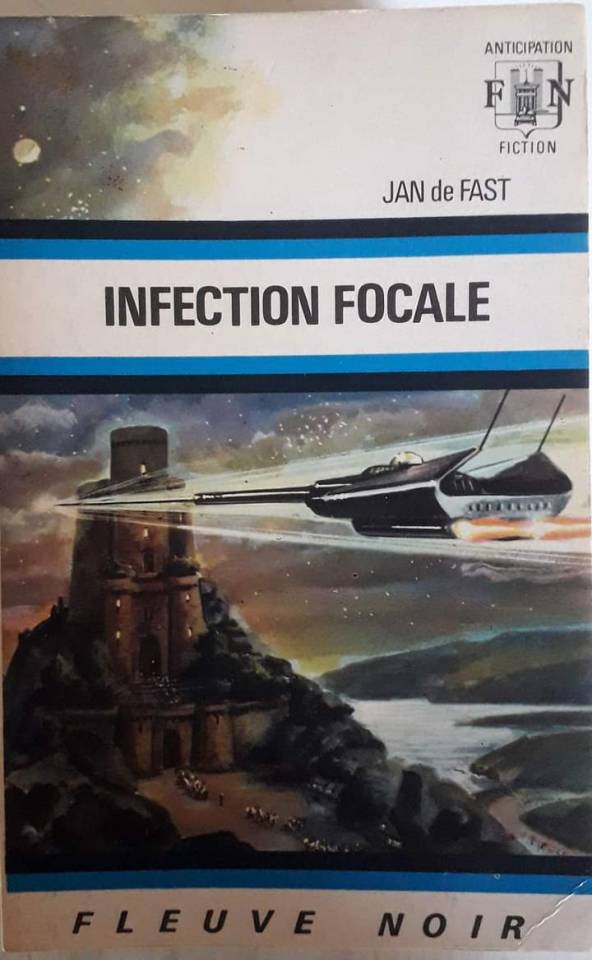
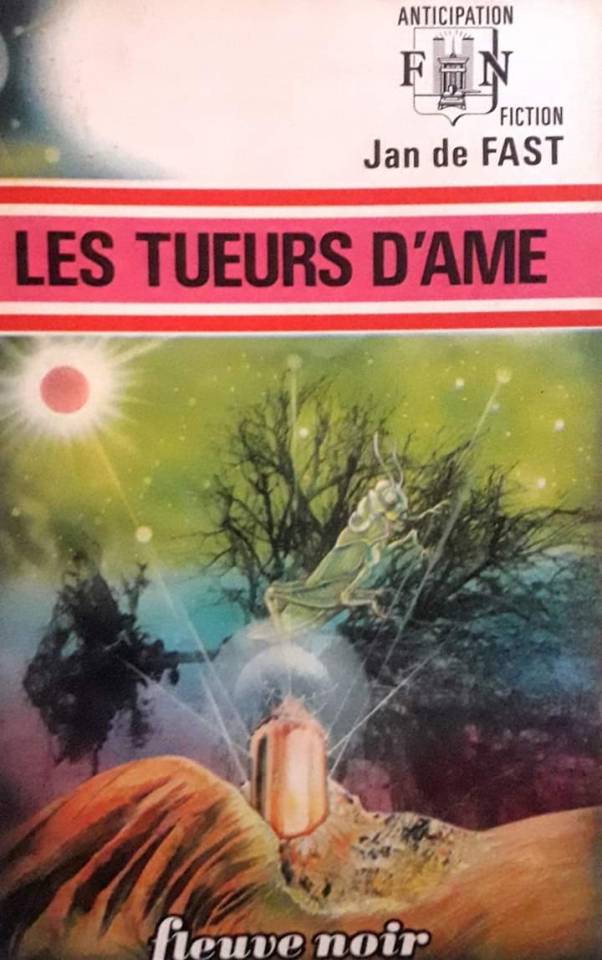
#Jean Bure #Karol Bor #Jan DeFast #litterature populaire #espionnage #anticipation #Le Toubib #Docteur Alan #Brantonne #Jef de Wulf #Gaston de Sainte-Croix #paperbacks
2 notes
·
View notes
Text
Un livre, un seul…et des fusils…beaucoup de fusils.
Un livre qui te donne le droit de prendre la terre qui t’appartient. Des fusils, beaucoup de fusils, pour ceux qui refusent de croire ce qui est écrit dans le livre.
Il n’en fallu pas plus pour que Mahmoud Darwich écrive le « Discours de l’Homme Rouge » dans lequel il ose la comparaison entre ce que vécurent les Indiens (faussement nommés) et ce que vivent les Palestiniens. Un livre et des fusils.
« Mort, ai-je dit ? Il n’y a pas de morts. Seulement un changement de mondes. » (Chef Seattle).
« …Vous avez votre dieu, et nous, le nôtre. Vos croyances, et nous, les nôtres. N’ensevelissez pas Dieu dans des livres qui vous ont fait promesse d’une terre qui recouvre la nôtre. Ne faites pas de Lui un huissier à la porte du roi…Qui élèvera nos voix à une pluie sèche dans les nuages ? Qui lavera la lumière après nous ? Qui habitera notre temple ? Qui préservera nos coutumes du fracas des métaux ?...Je vous annonce la bonne nouvelle de la civilisation, a dit l’Etranger…
Indiens morts valent mieux que vivants pour notre maître dans les cieux et Dieu est blanc, et blanc est ce jour…Vous avez un monde, et nous, un autre. Et l’Etranger prononce d’étranges paroles et chasse nos enfants et les papillons. Qu’as-tu promis à notre jardin, l’Etranger ? Roses de zinc plus belles que les nôtres ? Que ta volonté soit faite.
Mais sais-tu que la gazelle ne se nourrit point de l’herbe si notre sang l’effleure ? Sais-tu que les bisons sont nos frères, et la flore, l’Etranger ?...Ne blesse point la tortue, notre mère sommeille sur son dos, et nos arbres sont sa chevelure, et ses fleurs, nos atours…Point de morts en cette terre. N’altère pas la fragilité de sa constitution ! Nos fleuves sont sa hanche et nous sommes tous, vous et nous, ses enfants. Ne la mettez pas à mort. Sous peu nous partirons. Prenez notre sang et laissez-là, telle qu’elle est, la plus belle des choses par Dieu écrites sur les eaux…Les voix de nos ancêtres nous parviendront dans les vents et nous écouterons le battement de leur pouls dans les bourgeons de nos arbres. Cette terre est notre mère, pierre par pierre… »
(Mahmoud Darwich – Extrait du « Discours de l’Homme Rouge » - Traduit par Elias Sanbar – Editions BABEL)

3 notes
·
View notes
Text
Partageons mon rendez-vous lectures #14-2024 & critiques
Voici mes critiques littéraires sur Livres à profusion.
L’Inuite de Mo Malo
L’inuite de Mo Malo – Editions La Martinière
Krummavisur de Ian Manook
Krummavisur de Ian Manook – Editions Flammarion
Carolyn et John de Stéphanie des Horts
Carolyn et John de Stephanie des Horts – Editions Albin Michel
En lecture, L’eau qui dort de Fiona Barton
L’eau qui dort de Fiona Barton – Editions Fleuve…

View On WordPress
#CAROLYNETJOHN#Albin Michel#albin michel éditions#AVIS CAROLYN ET JOHN#AVIS CAROLYN ET JOHN DE STÉPHANIE DES HORTS#avis Ian Manook#AVIS KRUMMAVISUR#AVIS KRUMMAVISUR DE IAN MANOOK#AVIS L&039;INUITE#AVIS L&039;INUITE DE MO MALO#avis mo malo#avis romans Ian Manook#avis romans mo malo#AVIS STÉPHANIE DES HORTS#éditions albin michel#éditions La Martinière#CAROLYN ET JOHN#CAROLYN ET JOHN DE STÉPHANIE DES HORTS#Editions Flammarion#Flammarion#Flammarion éditions#Ian Manook#KRUMMAVISUR#KRUMMAVISUR DE IAN MANOOK#L&039;INUITE#L&039;INUITE DE MO MALO#LA MARTINIÈRE ÉDITIONS#La Martinière#mo malo#romans Ian Manook
0 notes
Text
♥ ♥ ♥ Le manège de la vie de Delphine GIRAUD ♥ ♥ ♥
Je remercie les Editions FLEUVE, NetGalley, l’Auteure, Delphine GIRAUD, pour ce service de presse. L’expérience a été exquise et remplie d’émotions. Une très belle lecture !
Le résumé des éditions FLEUVE – 09 février 2023 : Saisir une nouvelle chance… au risque de tout perdre.Seule dans le manège face à Furtivo, Tess prend son temps. Pas de longe, ni de stick. Juste son regard et ses mots pour…

View On WordPress
0 notes
Text
Lecture: Aquitania, de Eva Garcia Saenz de Urturi
En 1137, alors qu’il est sur les chemins de Compostelle, le duc d’Aquitaine est retrouvé mort, portant la marque de l’aigle. En Aquitaine, Aliénor est désormais duchesse d’Aquitaine, malgré son très jeune âge. Dans sa recherche de la vérité et de la vengeance, Aliénor devra faire preuve de prudence.
Continue reading Untitled

View On WordPress
0 notes
Text
A pleurer tout nous condamne
Auteur : Cécile Cabanac
Titre : A Pleurer Tout Nous Condamne
Date de parution : 7 mars 2024 – Editions Fleuve Noir
EAN : 9782265157903 – 432 pages
Native du Pays basque, Cécile Cabanac grandit à Saint-Jean de Luz. Après son bac, elle se rend à Bordeaux suivre des études d’histoires afin de devenir journaliste.
Cécile Cabanac (pseudonyme) est journaliste de formation,…

View On WordPress
0 notes
Text
Catalogue 2024 – Fleuve Editions – Le programme complet
https://gruznamur.com/2023/11/10/catalogue-2024-fleuve-editions-le-programme-complet/
View On WordPress
0 notes
Text
83
Mes forêts sont le bois usé d'une histoire
que racontent des lunes tenues à bout de bras
quand s'approchent la nuit et le hurlement
de nos peurs mes forêts
sont la mise en terre de vagues immenses
et de mots que je ne reconnais pas
elles sont un horizon de corps nus
sur le plateau des heures
qui bascule soudain
la danse très lente des ombres
vient hanter la machine de nos pas
et quand les brumes s'apaisent
mes forêts sont une poignée de rayons
plantés dans le sol durci
avec le réveil d'un temps
elles sont les paupières tremblantes d'un espoir
qui parle une langue d'écorce et de souffle
langue de tous les jours
- humiliée résistante conquise invaincue -
qui trouble et promet
avec des mots de travers mots de trop
de peut-être
où les temps se confondent
mes forêts parlent la langue du fleuve
celle d'algue et de limon
de rivières qui débordent
corps fous de joie ou emportés
dans les remous de leur vie
elles disent nos mains d'obscurité
de frêles beautés l'effroi
qui pèse sur demain
mes forêts
racontent une histoire
qui sauve et détruit
sauve
et détruit
alors nous rêvons
comme la sève qui sera
comme le sang
de ce qui n'est plus
nous sommes hauteur de montagne
parmi les brumes affolées
rien ne nous appartient
nous dénouons nous réparons
ce que nous pouvons
Dorion, Hélène, Mes forêts, Paris, Editions Bruno Doucey, Sacoche, 2021, p. 93 - 94
0 notes